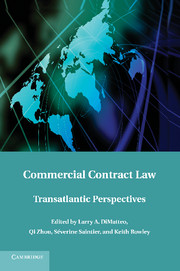Book contents
- Commercial Contract Law
- Commercial Contract Law
- Copyright page
- Dedication
- Brief Contents
- Contents
- Contributors
- Foreword
- Part I The Role of Consent
- Part II Normative Views of Contract
- Part III Contract Design and Good Faith
- Part IV Implied Terms and Interpretation
- Part V Policing Contracting Behavior
- Part VI Misrepresentation, Breach, and Remedies
- 16 Remedies for Misrepresentation
- 17 Re-Examining Damages for Fraudulent Misrepresentation
- 18 Remedies for a Documentary Breach
- 19 The Irrelevance of the Performance Interest
- Part VII Harmonizing Contract Law
- Index
19 - The Irrelevance of the Performance Interest
A Comparative Analysis of “Keep-Open” Covenants in Scotland and England
from Part VI - Misrepresentation, Breach, and Remedies
Published online by Cambridge University Press: 05 February 2013
- Commercial Contract Law
- Commercial Contract Law
- Copyright page
- Dedication
- Brief Contents
- Contents
- Contributors
- Foreword
- Part I The Role of Consent
- Part II Normative Views of Contract
- Part III Contract Design and Good Faith
- Part IV Implied Terms and Interpretation
- Part V Policing Contracting Behavior
- Part VI Misrepresentation, Breach, and Remedies
- 16 Remedies for Misrepresentation
- 17 Re-Examining Damages for Fraudulent Misrepresentation
- 18 Remedies for a Documentary Breach
- 19 The Irrelevance of the Performance Interest
- Part VII Harmonizing Contract Law
- Index
Summary
Much recent scholarship on the law of remedies for breach of contract has argued that greater protection should be afforded to a promisee’s interest in the performance of the primary obligations it is owed under a contract. This chapter examines and rejects the desirability of expanding the availability of the remedy of specific performance. The argument is based upon a detailed comparison between the currently prevailing law of keep-open covenants in, on the one hand, England and Wales, and on the other hand, Scotland, represented, respectively, by Co-operative Insurance Society Ltd v Argyll (Holdings) Ltd and Highland and Universal Properties Ltd v Safeway Properties Ltd. The Scottish position over the specific implement of tenants’ obligations to keep-open retail premises is the opposite to the position taken in England and Wales, and it is argued to be a superior position. The argument is that Scottish law reflects a greater respect for the performance interest and the position that this respect is derived from the civilian influences on Scottish law.
It has been argued that the Scottish position over specific implement of tenants’ obligations to keep open retail premises is opposite and superior to the position in England and Wales. This chapter will show, however, that the two jurisdictions are not as different as many characterisations have suggested and, further, that the current Scots law, which indeed is likely to grant specific implement, is a recent and radical departure. More significantly, however, the chapter examines the impact of this wider availability of specific implement upon the contracting behaviour of parties contemplating a commercial lease containing a keep-open clause. The key finding is that there are different effects on contracting behaviour of default rules which either allocate the risk of an uncompensated loss to the tenant or favour the landlord with a presumptive entitlement to a supra-compensatory remedy. The chapter argues in favour of the latter, English position, which was affirmed in Co-operative Insurance. It is emphasised, however, that it is not the default law, but rather the parties’ actual response to it that is important. The analysis of this key issue presented here implies the argument that the law should more commonly enforce primary obligations is entirely irrelevant to the parties’ behaviour.
- Type
- Chapter
- Information
- Commercial Contract LawTransatlantic Perspectives, pp. 466 - 502Publisher: Cambridge University PressPrint publication year: 2013
- 1
- Cited by



